Apple M1 Max
Rated: 7.5/10
Apple M2 Max
Rated: 9/10
Pros And Cons
| CPU | Pros | Cons |
|---|---|---|
| Apple M1 Max | ✅ More GPU Execution Units ✅ Better Price | ❌ Smaller L1, L2 Caches ❌ Lower Maximum Memory |
| Apple M2 Max | ✅ Faster CPU Speed ✅ More CPU Threads | ❌Lower GPU Execution Units ❌High Price |
- The Apple M2 Max chip showcases superior performance compared to the M1 Max, with higher scores in our Apple M2 Max vs Apple M1 Max benchmarks such as Cinebench R23, Passmark CPU, and Geekbench 5.
- The M2 Max demonstrates notable performance improvements across both single-core and multi-core tasks by 9.1% and 18.2% on average, respectively, offering faster speeds and enhanced multitasking capabilities.
- Our benchmarks showed that the M2 Max delivered impressive computational power and graphics performance, making it a suitable choice for demanding workloads.
- While the M2 Max offers enhanced performance, it comes at a higher price point than the M1 Max. Consider your budget and specific requirements before making a decision.
Comparison Table
| Key Specifications | M2 Max | M1 Max |
|---|---|---|
| Release Date | January 17, 2023 | May 7, 2022 |
| Base Clock (Performance) | 3.5 GHz | 3.2 GHz |
| Base Clock (Efficiency) | 2.4 GHz | 2.1 GHz |
| Total Cores | 12 | 10 |
| Total Threads | 12 | 10 |
| L1 Cache | 192K (per core) | 192K (per core) |
| L2 Cache | 32MB (shared) | 24MB (shared) |
| Transistors | 67 billion | 57 billion |
| GPU Base Clock | 450 MHz | 450 MHz |
| GPU Boost Clock | 1398 MHz | 1296 MHz |
| Cuda Cores | 4864 | 4096 |
| Display Capabilities | 7680x4320 - 60 Hz | 6016x3384 - 60 Hz |
Architectural Differences
The architectural differences between the Apple M2 Max vs Apple M1 Max chips contribute to their distinct capabilities and performance. Understanding these architectural variances sheds light on how these chips have been designed to excel in specific areas.
- Process Node: Spearheading technological advancements, the M2 Max and M1 Max leverage the cutting-edge 5nm fabrication process, embodying Apple’s unwavering dedication to innovation and unparalleled performance.
- Clock Speed: Unleashing impressive velocity, the M2 Max leads with a 2.4 GHz base clock and an impressive boost clock of up to 3.5 GHz, while the M1 Max offers strong performance with a 2.1 GHz base clock and a boost clock of up to 3.2 GHz.
- Memory Support Variation: Catering to power users and resource-intensive workflows, the M2 Ultra takes the lead with up to 192GB LPDDR5-6400, surpassing the M2 Max’s commendable support of up to 96GB LPDDR5-6400.
- TDP: Focusing on thermal efficiency, both the M1 Max and M2 Max operate with an optimal TDP of 30W, delivering efficient performance and balanced power consumption.
Introducing the Battle of Titans: Apple M2 Max vs Apple M1 Max. In this article, we delve into the realm of high-performance chips, exploring the specifications and performance benchmarks of these cutting-edge processors. Join us as we analyze the advancements made by the Apple M2 Max, comparing it to its predecessor, the M1 Max, to see just how far Apple’s chip technology has progressed.
Performance Benchmarks
When comparing the performance of the Apple M1 Max and M2 Max chips, benchmark tests provide valuable insights. These tests help evaluate the chips’ capabilities in various computing tasks and give a clearer understanding of their relative strengths and weaknesses. Let’s dive into the performance benchmarks to uncover how these chips fare in real-world scenarios.
Cinebench R23 (Single-Core)
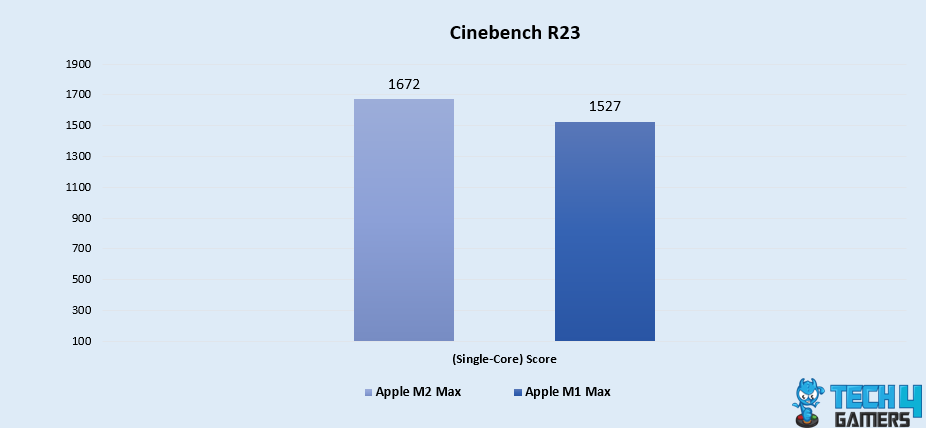
- In the Cinebench R23 Single-Core test, we saw that the M2 Max outperformed the M1 Max by 9%, achieving a score of 1672 compared to the M1 Max’s score of 1527.
Cinebench R23 (Multi-Core)
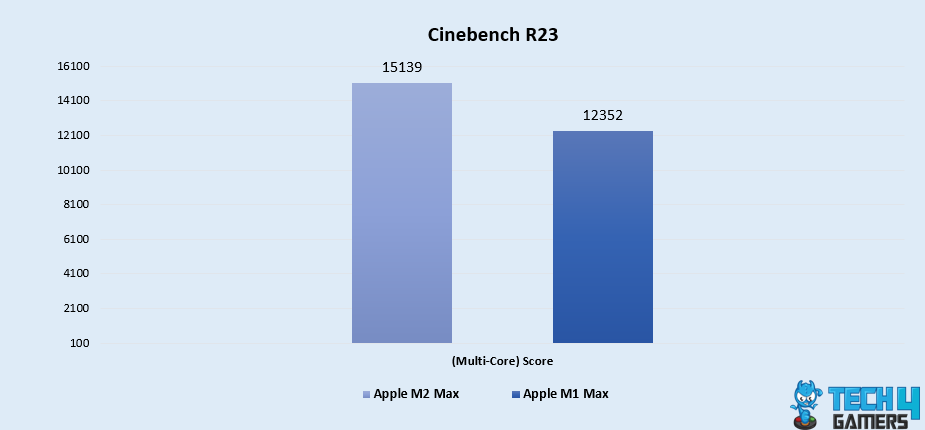
- The M2 Max showcased a significant 23% performance increase over the M1 Max in the Cinebench R23 Multi-Core test, scoring 15139 compared to the M1 Max’s score of 12352.
Passmark CPU (Single-Core)
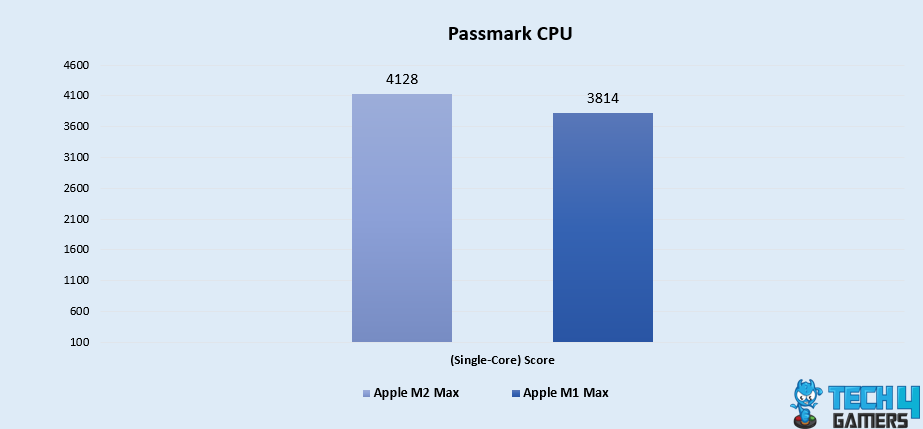
- With an 8% advantage, we observed that the M2 Max achieved a higher score of 4128 in our Passmark CPU Single-Core test compared to the M1 Max’s score of 3814.
Passmark CPU (Multi-Core)
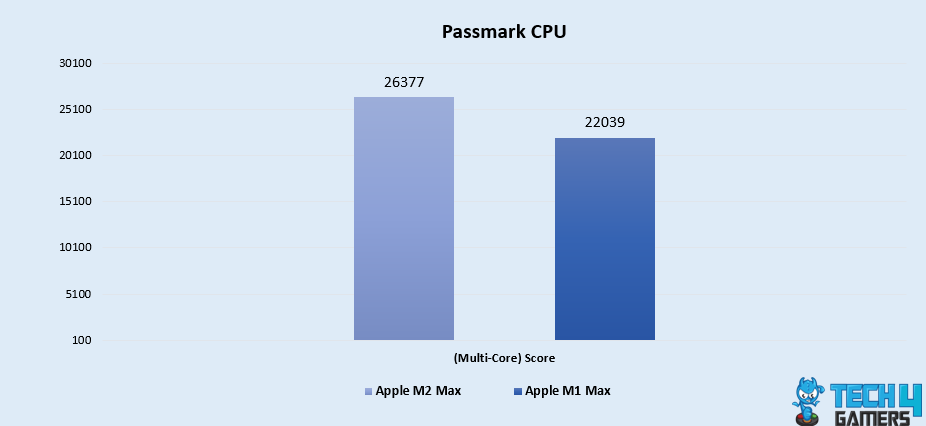
- The M2 Max dominated the Passmark CPU Multi-Core test with a remarkable 20% performance lead, scoring 26377 compared to the M1 Max’s score of 22039.
Geekbench 5 (Single-Core)
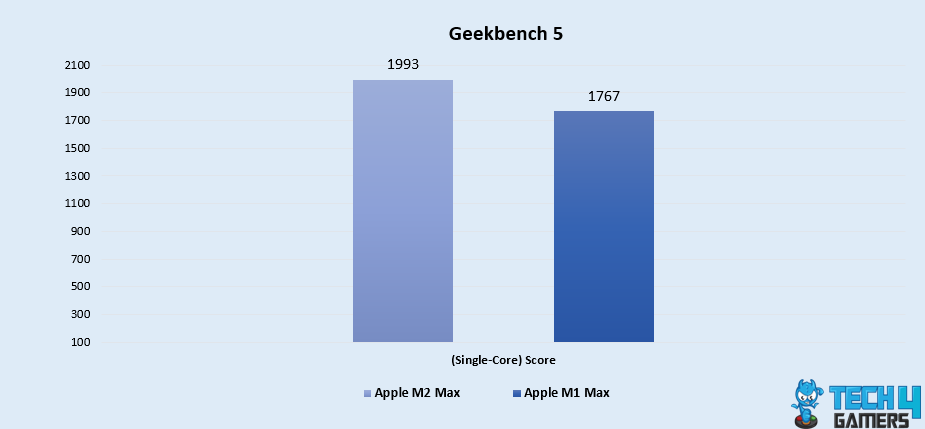
- In the Geekbench 5 Single-Core test, the M2 Max demonstrated a 13% performance gain over the M1 Max, achieving a score of 1993 compared to the M1 Max’s score of 1767.
Geekbench 5 (Multi-Core)
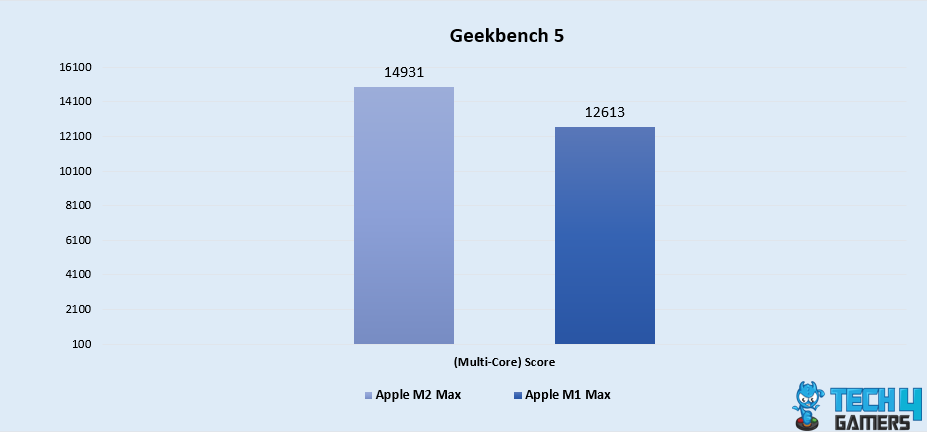
- The M2 Max surged ahead with an 18% performance advantage in our Geekbench 5 Multi-Core test, scoring 14931 compared to the M1 Max’s score of 12613.
Verdict
Apple M2 Max: We’ve noted that the Apple M2 Max boasts enhanced performance and efficiency with its second-generation architecture, providing faster speeds and improved multitasking. However, it comes at a higher price compared to the M1 Max, so consider your budget carefully before deciding.
Apple M1 Max: The Apple M1 Max comes at a relatively lower price than the M2 Max while delivering slightly lower performance in our productivity benchmarks as well. However, we reckon that the processor will remain feasible to the users considering prices.
We recommend the M2 Max to users looking for ultimate performance in single-core and multicore performance but it will come with a price tradeoff. So, the users looking for performance should have some extra bucks in hand.
More From Apple M2 Max:
Thank you! Please share your positive feedback. 🔋
How could we improve this post? Please Help us. 😔
[Comparisons Specialist]
I’m a passionate computer hardware expert specializing in CPUs and GPUs. With a lifelong curiosity for hardware and extensive hands-on experience, I provide valuable insights, practical advice, and in-depth analysis on these components. Engaging with the hardware community, I exchange knowledge and stay at the forefront of technological advancements.
Get In Touch: uzair@tech4gamers.com


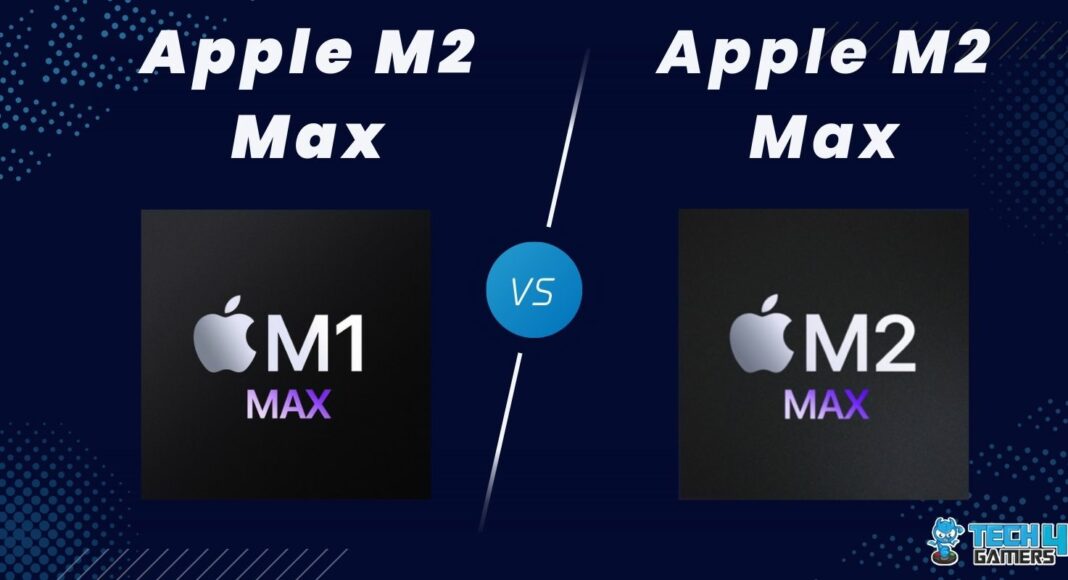

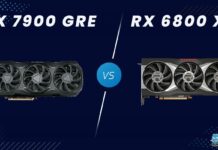
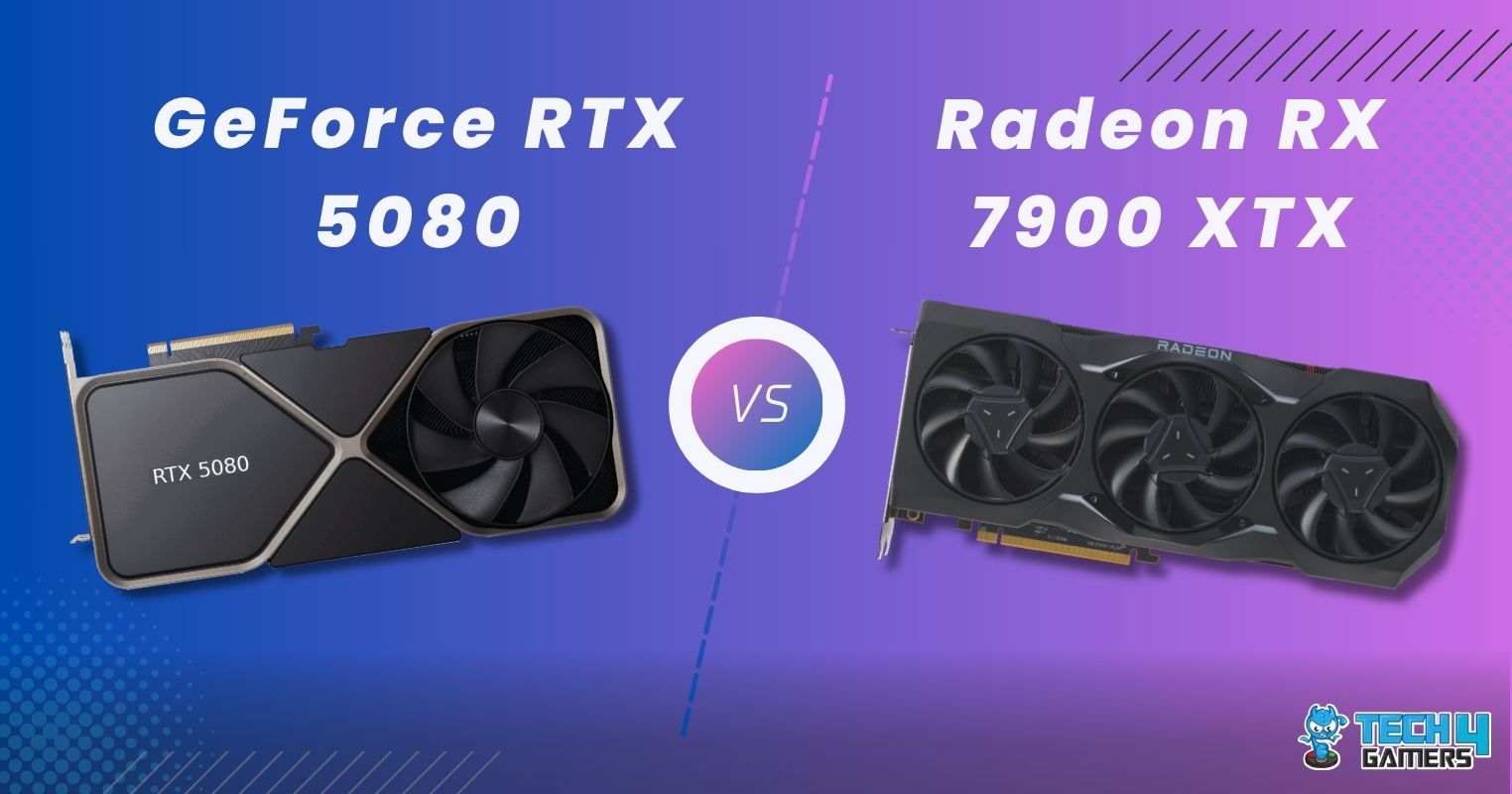
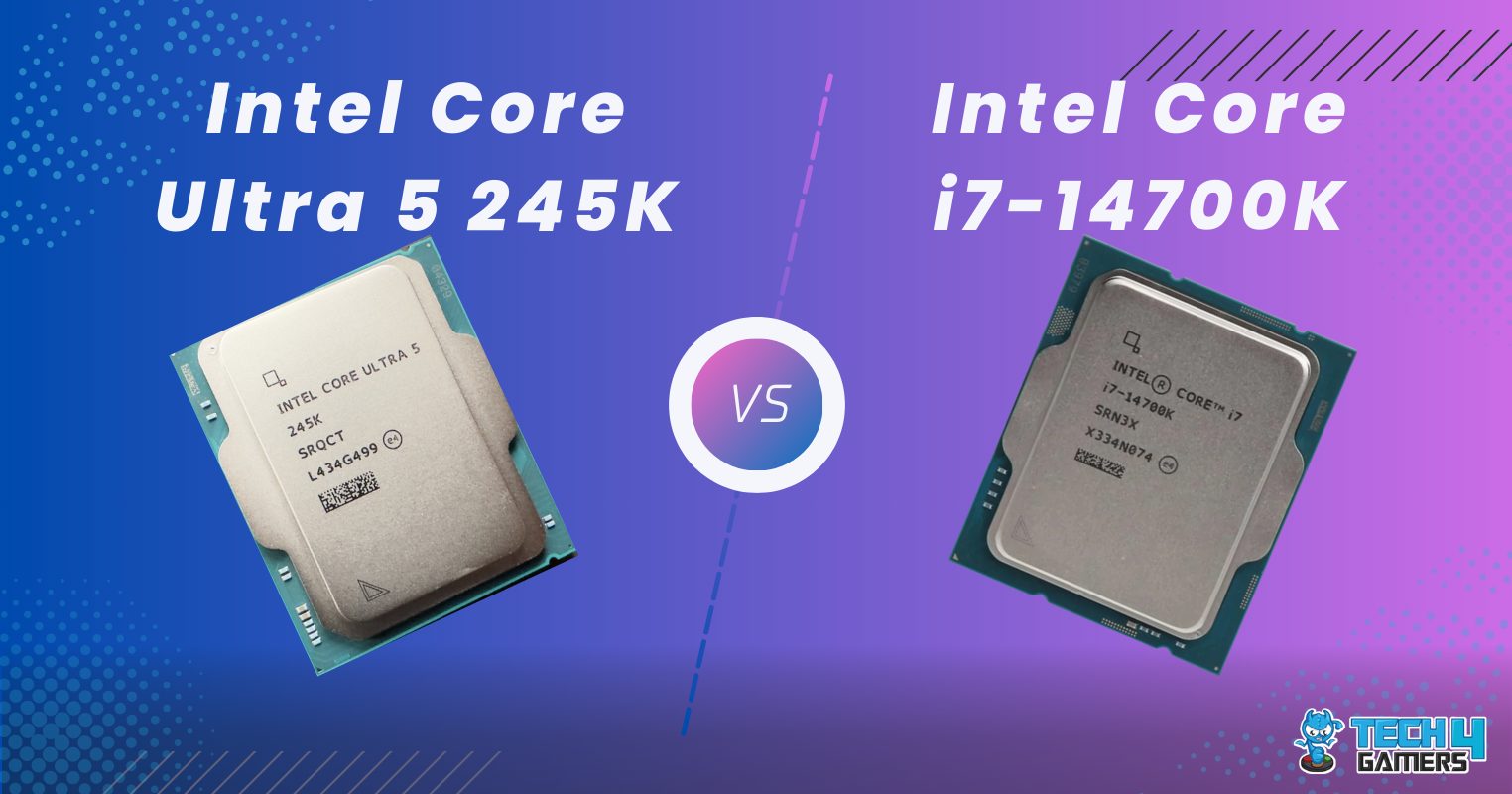

![RTX 4070 Super Vs RX 6800 XT [We Tested Both] Nvidia GeForce RTX 4070 Super Vs AMD Radeon RX 6800 XT](https://tech4gamers.com/wp-content/uploads/2024/02/RTX-4070-Super-Vs-RX-6800-XT-218x150.jpg)